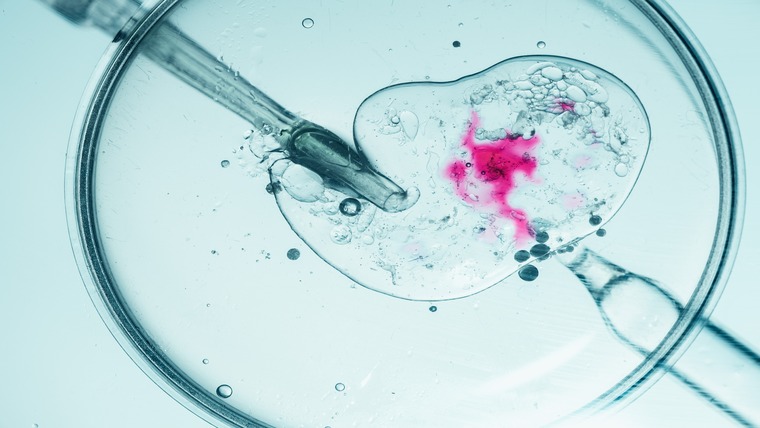
What is an IVF Center?
In Vitro Fertilization (IVF) is an assisted reproductive technique used to help couples who cannot have children naturally have babies. An IVF center is a private health institution where this procedure is performed. These centers, with their modern technology and expert teams, conduct detailed examinations of couples' reproductive problems and offer personalized treatment plans. In IVF centers, egg and sperm cells are fertilized in a laboratory environment and the resulting embryo is transferred to the mother's uterus.
About IVF Center
IVF centers aim to help couples who are unable to conceive naturally using advanced reproductive technologies. These centers work with a multidisciplinary team consisting of doctors, embryologists, nurses and psychologists who are experts in both male and female reproductive health. The modern laboratories in the centers are equipped with the most advanced equipment for procedures such as embryo culture, genetic diagnosis and sperm microinjection. In addition, couples are provided with emotional support and informative and guiding counseling services at every stage of the treatment process.
Who is an In Vitro Fertilization (IVF) Specialist and What Are Their Duties?
An IVF specialist is a medical doctor who specializes in male and female reproductive health. These specialists are authorized to diagnose infertility, plan treatment, and manage the IVF process. Their duties include evaluating patients’ reproductive health, determining appropriate treatment methods, and performing surgical procedures such as egg collection and embryo transfer. They also manage complications that may occur during the treatment process and take all necessary steps to ensure the highest success rate for patients.
What Tests and Procedures Are Performed at the IVF Center?
The examinations and procedures performed in IVF centers are carried out meticulously to obtain the best results at every stage of the treatment process. The following steps are followed in this process:
Ovarian Stimulation and Monitoring:- Hormonal Stimulants: Laboratory-created hormones are used to stimulate a woman's ovaries to produce multiple eggs. These hormones include Follicle Stimulating Hormone (FSH), Luteinizing Hormone (LH), and HCG (human chorionic gonadotropin). These hormones help stimulate the eggs to mature and trigger the ovaries at the right time prior to ovulation.
- Vaginal Ultrasound: This is an imaging test performed to monitor the development of follicles in the ovaries. The number and size of the follicles are monitored with ultrasound to determine whether the eggs are suitable for collection.
- Blood Tests: Blood tests are done to evaluate the ovaries' response to hormonal stimulation. These tests monitor estrogen levels, which usually rise as follicles develop. Progesterone levels are also monitored, which increases after ovulation.
- Transvaginal Ultrasound Aspiration: Egg collection is done 34-36 hours after the last hormone injection, before ovulation occurs. This procedure is performed under light anesthesia, with a needle that reaches the follicles with the help of an ultrasound device inserted into the vagina. The needle collects the eggs from the follicles and these eggs are stored in a liquid.
- Abdominal Ultrasound: In cases where the ovaries cannot be reached vaginally, eggs are collected with a needle under ultrasound guidance from the abdominal area.
Sperm Collection and Preparation:
Fertilization Process:
- Conventional Insemination: Healthy sperm and mature eggs are brought together in a controlled incubator in a laboratory environment and the natural fertilization process is observed.
- Intracytoplasmic Sperm Injection (ICSI): A single healthy sperm is injected directly into a mature egg. This method is preferred in cases where sperm quality or count is low, or if previous IVF attempts have failed to fertilize.
- Assisted Hatching: A small hole is made in the membrane surrounding the embryo to facilitate its attachment to the uterine wall. This procedure is especially recommended for women who are planning to become pregnant at an older age or for those who have had unsuccessful IVF attempts before.
- Preimplantation Genetic Testing (PGT): Embryos are tested for genetic diseases or chromosomal abnormalities. Based on the test results, healthy embryos are selected and transferred to the uterus.
These tests and practices are meticulously implemented to increase the success of in vitro fertilization/IVF treatment and maximize couples' chances of achieving a healthy pregnancy.
What Does the In Vitro Fertilization (IVF) Treatment Process Include?
The in vitro fertilization treatment process is a step-by-step process that requires great care at every stage.
The process consists of the following stages:- Preparation Phase: Before starting the treatment, the woman's ovaries are stimulated to produce more than one egg.
- Egg Collection: Eggs are collected under light anesthesia with ultrasound guidance.
- Fertilization: The collected eggs are fertilized with sperm in a laboratory environment.
- Embryo Development: Fertilized eggs develop in the laboratory for several days.
- Embryo Transfer: Developed embryos are transferred to the uterus.
- Pregnancy Test: Approximately 10-12 days after the transfer, a pregnancy test is performed to check whether the treatment was successful.
In Which Cases Is In Vitro Fertilization (IVF) Treatment Preferred?
IVF treatment is generally preferred in the following cases:
- Tubal Obstruction: In cases where the woman's fallopian tubes are blocked.
- Male Infertility: In cases where sperm count, motility or morphology are inadequate.
- Unexplained Infertility: In cases of infertility where the cause cannot be explained.
- Advanced Age: When pregnancy cannot be achieved naturally due to the woman's age.
What Factors Depend on Success in In Vitro Fertilization (IVF) Treatment?
There are many factors that affect the success of in vitro fertilization treatment.
Among them:- Age of the Woman: The success rate is higher in younger women.
- Embryo Quality: Transfer of quality embryos increases the chance of success.
- Uterine Health: A healthy uterus increases the chances of an embryo implanting.
- Sperm Quality: Good quality sperm is critical for fertilization and embryo development.
- Center and Expert Experience: An experienced team and a well-equipped center positively affect the success rate.
What are the risks of in vitro fertilization (IVF) treatment?
Like any medical treatment, IVF treatment also carries some risks.
These:- Ovarian Hyperstimulation Syndrome (OHSS): A condition that occurs as a result of excessive stimulation of the ovaries.
- Multiple Pregnancy: Transferring more than one embryo increases the risk of multiple pregnancies such as twins or triplets.
- Ectopic Pregnancy: This is when the embryo implants outside the uterus, usually in the fallopian tubes.
- Ovarian Sprain: There is a risk of ovarian sprain during the treatment process.
- Medication-Related Side Effects: Medications used during hormonal treatment may have side effects.


